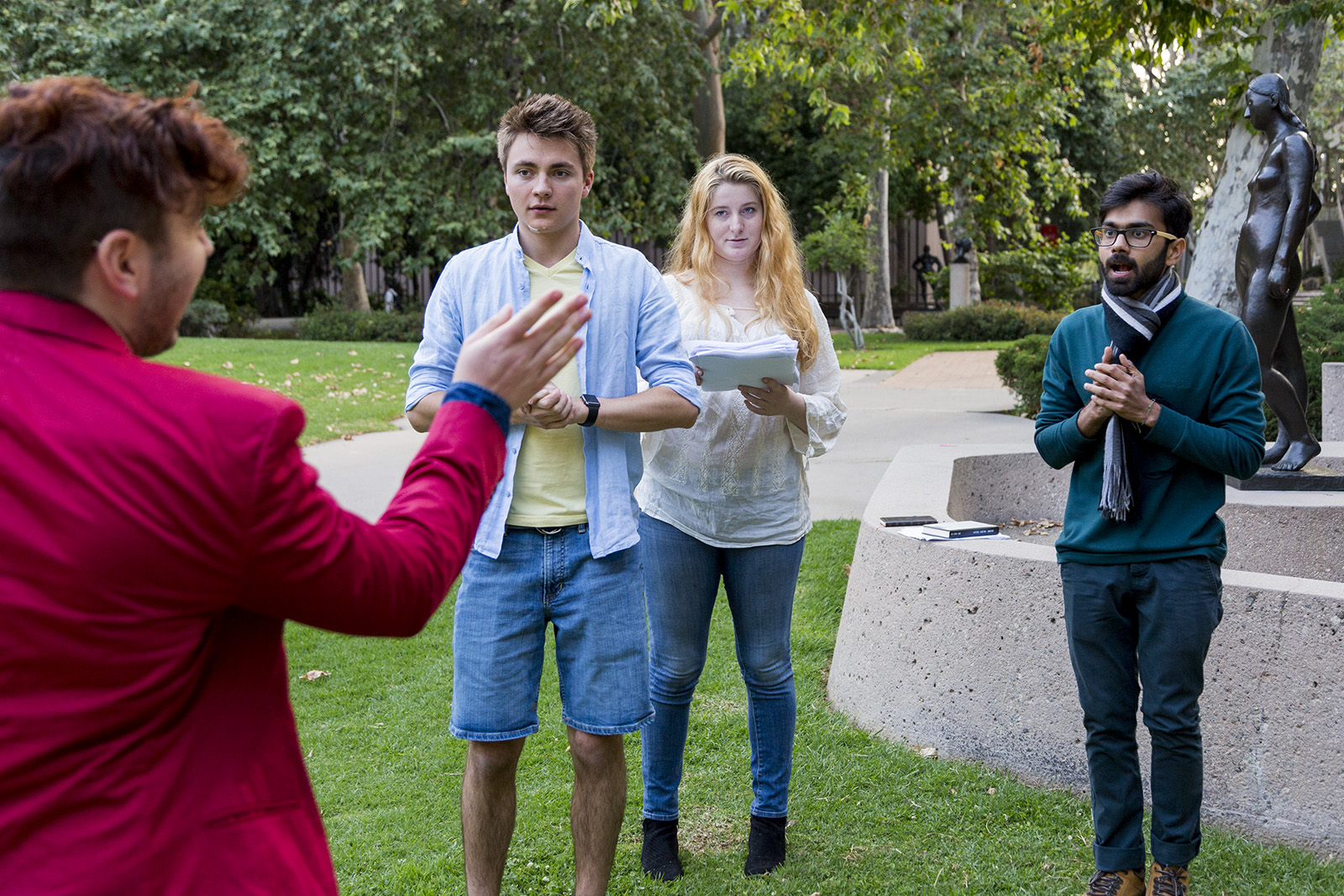UCLA Shakespeare company explores meaning of love in ‘Fourteen Lines’

The Shakespeare Company at UCLA is putting on “Fourteen Lines,” a play written, casted and directed by second-year theater student Davia Schendel. The show is based on Shakespearean characters and sonnets, and it searches for the meaning of love across centuries. (Amy Dixon/Daily Bruin)
"Fourteen Lines"
Directed by Davia Schendel
Shakespeare Company at UCLA
Mildred E. Mathias Botanical Garden
Saturday and Sunday, times vary
FREE
By Faizan Malik
May 31, 2017 11:09 p.m.
Davia Schendel wrote her first play on the back of her eighth-grade school notebook.
Since then, she’s written three more plays, two during her freshman year at UCLA and one this year. Her latest play, “Fourteen Lines,” will open Saturday at the Mildred E. Mathias Botanical Garden with Shakespeare Company at UCLA and will run until June 4.
“Fourteen Lines” focuses on a group of college students discussing the concept of love during one of their poetry group excursions. Schendel, a third-year theater student, directed, casted and wrote the play, which incorporates Shakespearean archetypal characters and sonnets to help understand the meaning of love.
“How do you define love? What is it?” Schendel said. “We won’t understand it fully ever, and that’s why people like Shakespeare wrote these sonnets full of confusion, frustration and melancholy.”
The characters themselves have different definitions of love. Lysander, portrayed by second-year theater student Björn Hedqvist, believes love is an emotion that can be explained scientifically, while Franca, portrayed by first-year theater student Danielle Bongiovanni, believes that love is just spontaneous desire. Schendel used Shakespeare’s sonnets, including Sonnet 20, Sonnet 21 and Sonnet 144, as a way to represent differing views of love and reflect the characters’ inner worlds.
“Poetry is often a medium that puts someone’s inner world into words,” Schendel said. “I wanted the sonnets to be the opportunity for each character to have (his or her) say in a very intimate way.”
The play’s colloquial English such as “love is timing” juxtaposed with Shakespearean English like “thou art more lovely and more temperate” provides audiences with a smooth introduction to the famous writer’s works, Bongiovanni said.
Since the play includes both modern text and Shakespearean text, it tries to apply Shakespeare’s work to today’s society, just as it did in the 17th century, Bongiovanni said.
Combining the two dialects in one script was challenging because the difference in diction can be jarring, but Hedqvist said Schendel combined them in a natural manner.
“Davia doesn’t force Shakespeare to work in a modern time,” Hedqvist said. “Performing that alongside colloquial English can be a challenge but she really presents it in a great way.”
Although Schendel started working on the play last year, she hadn’t started writing the dialogue until a few months ago. Once she cast her actors and started rehearsals at the beginning of spring quarter, she reworked bits of dialogue to accommodate the actors’ styles.
For example, Schendel reworked a scene involving Hedqvist’s character Lysander chasing a bird. She edited the dialogue to match Hedqvist’s energetic manner of speech because she enjoyed his ad-libs in real life.
“They’re like instruments, they have their own voice and certain style, so I thought I’d like to enhance what they have,” Schendel said.
Towards the end of the play, the company performs Sonnet 18 together, which Hedqvist said is one of Shakespeare’s best known sonnets. Each character gives his or her own interpretation of how the sonnet expresses love, highlighting the many ways love can be interpreted. The characters also all fit archetypal Shakespearean roles such as the comic relief and the wiseman, which allows the mix of language to work well, because these characters were influenced by The Bard’s work, Hedqvist said.
“These sonnets all inspired the show’s writing and the characters were born out of the things we see in The Bard’s quatrains,” Hedqvist said. “In that way, the language is almost their mother tongue and it shows.”
When Schendel first discovered Shakespeare’s sonnets in middle school, she said she enjoyed them but didn’t understand them fully. However, after exploring The Bard’s works, she realized the depth of his poetry, which is able to put complicated feelings, such as love, into actual words.
“I would like people to walk away from the show being hopeful that love does exist and love will come,” Schendel said. “It’s just a mystery and people should not try to dissect love too much but live their lives and experience love by living.”


